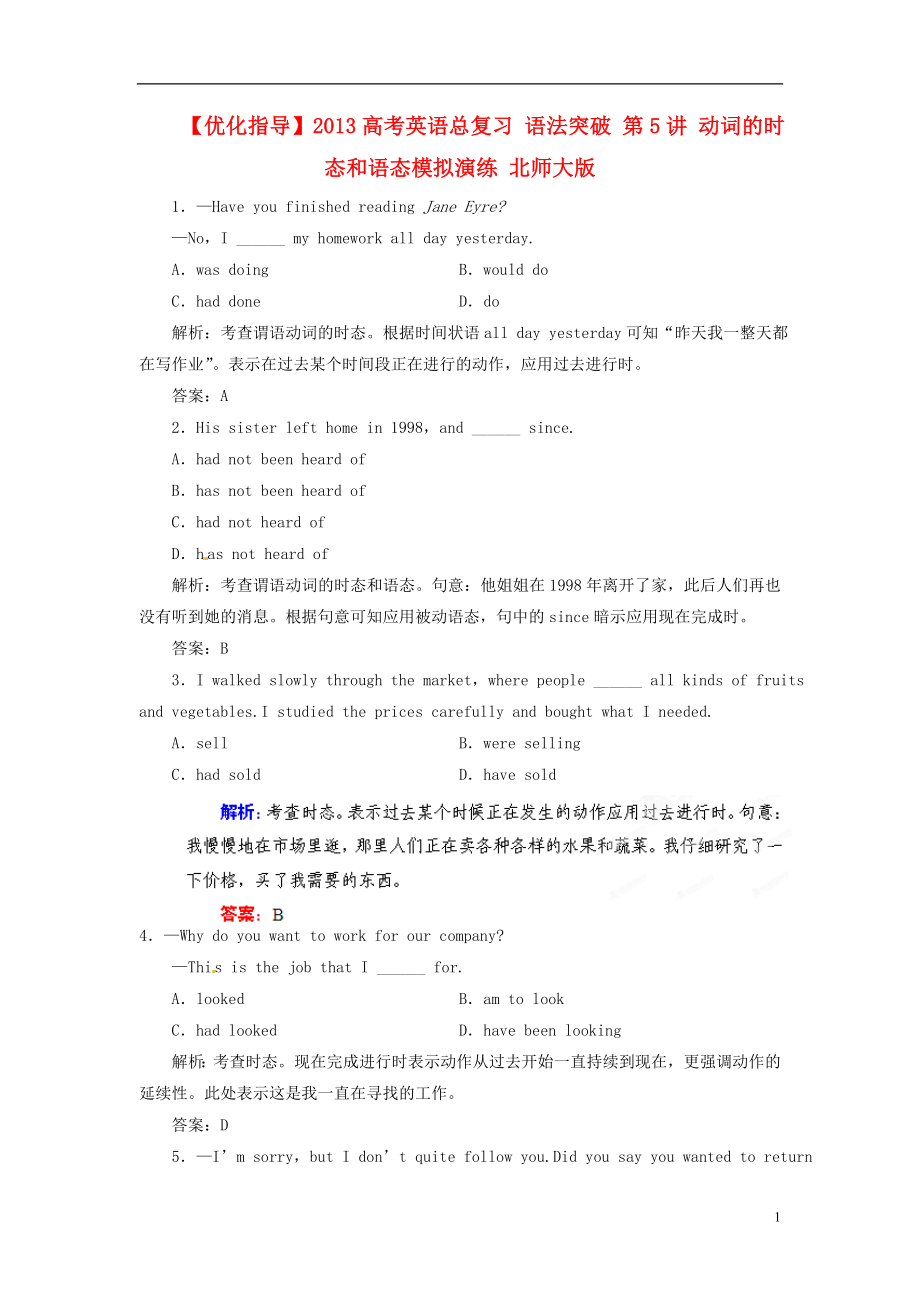《【優(yōu)化指導(dǎo)】2013高考英語(yǔ)總復(fù)習(xí) 語(yǔ)法突破 第5講 動(dòng)詞的時(shí)態(tài)和語(yǔ)態(tài)模擬演練 北師大版》由會(huì)員分享��,可在線閱讀��,更多相關(guān)《【優(yōu)化指導(dǎo)】2013高考英語(yǔ)總復(fù)習(xí) 語(yǔ)法突破 第5講 動(dòng)詞的時(shí)態(tài)和語(yǔ)態(tài)模擬演練 北師大版(6頁(yè)珍藏版)》請(qǐng)?jiān)谘b配圖網(wǎng)上搜索���。
1���、
【優(yōu)化指導(dǎo)】2013高考英語(yǔ)總復(fù)習(xí) 語(yǔ)法突破 第5講 動(dòng)詞的時(shí)態(tài)和語(yǔ)態(tài)模擬演練 北師大版
1.—Have you finished reading Jane Eyre?
—No,I ______ my homework all day yesterday.
A.was doing B.would do
C.had done D.do
解析:考查謂語(yǔ)動(dòng)詞的時(shí)態(tài)�����。根據(jù)時(shí)間狀語(yǔ)all day yesterday可知“昨天我一整天都在寫作業(yè)”���。表示在過去某個(gè)時(shí)間段正在進(jìn)行的動(dòng)作�����,應(yīng)用過去進(jìn)行時(shí)�����。
答案:A
2.His sister left home in 199
2���、8,and ______ since.
A.had not been heard of
B.has not been heard of
C.had not heard of
D.has not heard of
解析:考查謂語(yǔ)動(dòng)詞的時(shí)態(tài)和語(yǔ)態(tài)�����。句意:他姐姐在1998年離開了家�,此后人們?cè)僖矝]有聽到她的消息。根據(jù)句意可知應(yīng)用被動(dòng)語(yǔ)態(tài)���,句中的since暗示應(yīng)用現(xiàn)在完成時(shí)��。
答案:B
3.I walked slowly through the market���,where people ______ all kinds of fruits and vegetables.I studied
3��、the prices carefully and bought what I needed.
A.sell B.were selling
C.had sold D.have sold
4.—Why do you want to work for our company?
—This is the job that I ______ for.
A.looked B.a(chǎn)m to look
C.had looked D.have been looking
解析:考查時(shí)態(tài)?�,F(xiàn)在完成進(jìn)行時(shí)表示動(dòng)作從過去開始一直持續(xù)到現(xiàn)在�,更強(qiáng)調(diào)動(dòng)作的延續(xù)性�。此處表示這是我一直在尋找的工作。
4�����、
答案:D
5.—I’m sorry�,but I don’t quite follow you.Did you say you wanted to return on September 20?
—Sorry,I ______ myself clear.We want to return on October 20.
A.hadn’t made B.wouldn’t make
C.don’t make D.haven’t made
解析:考查動(dòng)詞的時(shí)態(tài)�����。根據(jù)題干內(nèi)容可知��,答話者是說自己沒有把話說清楚從而導(dǎo)致對(duì)方誤解����,即這一動(dòng)作對(duì)現(xiàn)在造成了影響��,所以用現(xiàn)在完成時(shí)����。
答案:D
5����、
6.—Peter���,where did you guys go for the summer vacation?
—We ______ busy with our work for months�����,so we went to the beach to relax ourselves.
A.were B.have been
C.had been D.will be
解析:考查動(dòng)詞的時(shí)態(tài)���。結(jié)合問句中的時(shí)態(tài)以及答語(yǔ)后半句中的時(shí)態(tài)可知答語(yǔ)前半句表示的是過去的過去,所以用過去完成時(shí)���。
答案:C
7.(2012福州質(zhì)檢)James Cameron’s movie Avatar����,set
6���、in 2154�����,______place on a planet called Pandora.
A.will take B.will be taken
C.takes D.is taken
解析:考查動(dòng)詞的時(shí)態(tài)和語(yǔ)態(tài)����。描述電影和電視劇等內(nèi)容時(shí)通常用一般現(xiàn)在時(shí);take place不用于被動(dòng)結(jié)構(gòu)�����。
答案:C
8.—What’s that terrible noise���,David?
—Oh����,I forgot to tell you.The new machines in the nearby plant ______.
A.were tested B.will be te
7�����、sted
C.a(chǎn)re being tested D.have been tested
解析:考查動(dòng)詞的時(shí)態(tài)和語(yǔ)態(tài)��。根據(jù)問句中的What’s that terrible noise可知�����,這里應(yīng)該用進(jìn)行時(shí)態(tài),噪音是機(jī)器正在被檢測(cè)時(shí)發(fā)出的���,所以用現(xiàn)在進(jìn)行時(shí)的被動(dòng)語(yǔ)態(tài)�。
答案:C
9.(2012西城區(qū)質(zhì)檢)—When can I get my car back?
—I think it ______ sometime later today.Give me a call around 3 o’clock.
A.will be finished B.finishes
C.will
8�����、finish D.will be finishing
解析:考查動(dòng)詞的時(shí)態(tài)和語(yǔ)態(tài)����。語(yǔ)意表示“車今天晚些時(shí)候修好”�,動(dòng)作發(fā)生在將來,同時(shí)汽車是“被修理的”�,用被動(dòng)語(yǔ)態(tài),綜合用will be done結(jié)構(gòu)���。
答案:A
10.—What ______ this time tomorrow morning?
—Er��,I’m not sure for the moment.
A.will you do B.will you be doing
C.a(chǎn)re you to do D.a(chǎn)re you going to do
解析:考查動(dòng)詞的時(shí)態(tài)�����。問話人問的是:明天上午的這個(gè)時(shí)候��,你會(huì)在
9��、做什么����?所以要用將來進(jìn)行時(shí)。
答案:B
11.(2012杭州檢測(cè))Hello����,you ______ 86558225.I’m sorry,but I’m unable to answer your question right now.
A.reached B.were reaching
C.have reached D.had reached
解析:考查動(dòng)詞的時(shí)態(tài)��。句意:你現(xiàn)在接通了86558225�����。此處表示已經(jīng)接通了���,因此用現(xiàn)在完成時(shí)��。
答案:C
12.(2012南昌調(diào)研)We carved their names on the stone so that the y
10���、ounger generation should know what their forefathers ______ for the nation.
A.did B.had done
C.were doing D.have done
解析:考查動(dòng)詞的時(shí)態(tài)�。語(yǔ)意:我們把他們的名字刻在石碑上是為了讓后代了解他們的祖先都為這個(gè)國(guó)家做過什么事����。顯然祖先們的事跡在carved之前發(fā)生,因此這里應(yīng)用過去完成時(shí)��。
答案:B
13.(2012杭州檢測(cè))—Barbara lost her key again yesterday.
— ______����?That’s her third time
11、 in just one month.
A.Does she B.Had she
C.Has she D.Did she
解析:考查時(shí)態(tài)和省略��。根據(jù)第一個(gè)人話語(yǔ)中的lost和yesterday可知�����,應(yīng)用一般過去時(shí)����。Did she是Did she lose her key的省略�����。
答案:D
14.(2012合肥檢測(cè))—I called you last night,but nobody answered.
—Oh���,I usually ______ off my cellphone by 8:00 p.m..
A.switched B.have switched
C.s
12��、witch D.had switched
15.(2012湘潭模擬)It seems that oil ______ from this pipe for some time.We’ll have to take the machine apart to put it right.
A.have leaked B.is leaking
C.leaked D.has been leaking
解析:考查動(dòng)詞的時(shí)態(tài)��。句意:似乎石油從管子里漏了一段時(shí)間了���,我們得趕快把機(jī)器修理好。根據(jù)句意可知�����,石油從過去開始到現(xiàn)在一直在漏���,應(yīng)該用現(xiàn)在完成進(jìn)行時(shí)����。
答案:D
16.(2012湖
13����、南適應(yīng)性測(cè)試)—Why are you still here?Everybody has gone to attend the lecture by the president.
—Oh���,I ______ about it!
A.wasn’t informed B.hadn’t been informed
C.haven’t informed D.didn’t inform
解析:考查動(dòng)詞的時(shí)態(tài)和語(yǔ)態(tài)�����。從語(yǔ)意可知��,我沒有去聽講座�����,是因?yàn)橹?過去某個(gè)時(shí)候)沒有人通知我�,因此應(yīng)該使用一般過去時(shí)態(tài)。因?yàn)槲覜]有被(別人)通知�����,故用被動(dòng)語(yǔ)態(tài)����。
答案:A
17.Mr Li arriv
14���、ed at the Wuchang Railway Station twenty minutes ago��,but the train to Guangzhou ______ yet.
A.hadn’t come B.won’t come
C.hasn’t come D.didn’t come
解析:考查動(dòng)詞的時(shí)態(tài)���。根據(jù)句中的時(shí)間狀語(yǔ)twenty minutes ago可知Mr Li到達(dá)車站是在20分鐘前�����,因此�,火車還沒有來是到目前為止還沒到�,應(yīng)該用現(xiàn)在完成時(shí)態(tài)。
答案:C
18.(2012湖南適應(yīng)性測(cè)試)She won’t be able to come next week���,
15�����、because she ______ herself in Mount Tai then.
A.enjoys B.will be enjoying
C.is enjoying D.enjoyed
解析:考查動(dòng)詞的時(shí)態(tài)����。根據(jù)語(yǔ)意可知下周這個(gè)時(shí)候她會(huì)在游覽泰山����,因此應(yīng)該使用將來進(jìn)行時(shí)態(tài),表示將來某個(gè)時(shí)候某個(gè)動(dòng)作正在進(jìn)行���。
答案:B
19.(2012江西聯(lián)考)When you arrive�,I ______ in reception for you.
A.wait B.a(chǎn)m waiting
C.a(chǎn)m going to wait D.will be waiting
解析
16、:考查動(dòng)詞的時(shí)態(tài)�����。句意:你到的時(shí)候����,我會(huì)在接待處等你。將來進(jìn)行時(shí)表示在將來某個(gè)時(shí)候正在做的事情��,符合題意����。
答案:D
20.(2012湖南聯(lián)考)—Mum,where is my toy cowboy��?I ______ it under the bed.
—It ______ inside your toy bucket.Remember���,that’s where all your toys are supposed to go.
A.have put��;is B.put����;is
C.have put���;was D.out�;was
6
 【優(yōu)化指導(dǎo)】2013高考英語(yǔ)總復(fù)習(xí) 語(yǔ)法突破 第5講 動(dòng)詞的時(shí)態(tài)和語(yǔ)態(tài)模擬演練 北師大版
【優(yōu)化指導(dǎo)】2013高考英語(yǔ)總復(fù)習(xí) 語(yǔ)法突破 第5講 動(dòng)詞的時(shí)態(tài)和語(yǔ)態(tài)模擬演練 北師大版

